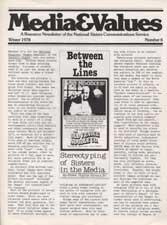Is It Time to Move the TV?
|
This article originally appeared in Issue# 6
|
Reflection questions for 'families' of 2 to 20
About seven years ago, sophomores that I had for an English Humanities class commented on television's effect on their family. These young women protested the substitution of TV as baby sitter and quasi-parent for their younger brothers and sisters. They observed that shared activities and conversation in the family had diminished because of TV's constant usage and that multiple TV sets about the house had fragmented the family unit.
If one needs scientific data to accept the students' observations, such scholarly information is in the spring, 1978 issue of the respected and recognized Journal of Communications. "The Impact of Television on American Institutions" by George Comstock, professor of Communications at the 5.1. Newhouse School of Public Communications, Syracuse University, validates as well as extends the students' observations.
A summarizing statement of the article says, "Television's presence in the American home has brought many changes to family life and the rearing of children, including new patterns of interaction, alteration of activities, and vicarious socialization." Comstock writes, "Almost half of American households have two or more television sets. With multiple sets, viewing alone increases and joint viewing by family members decreases." Thus, the viewing pattern under such circumstances results in an increase of children watching TV without their parents with an accompanying increase of joint viewing by husbands and wives without their children.
Without straining, the preceding observations can be transferred to 'families' of any size, including those of us who live together in religious community. No one denies the good of TV-its moments of live coverage, entertainment and relaxation as well as information. The issue is whether communication among members is helped or hindered by the placement of the television in any communal setting.
When turned on, television does possess a near mesmerizing effect on others present. Even if one does not wish to watch a program, TV is hard to ignore; it does intrude on the non-viewer. More importantly have shared activities and conversation which are the building blocks of intimate community and family life, diminished because of TV?
If you suspect this may be true in your house, talk and share with one another these questions:
- What happens to conversation because of the TV?
- Must silence be maintained?
- Or is conversation that is not obtrusive to the TV accepted?
- Or is conversation primary to the TV?
- Are some programs enjoyed together or is viewing consistently individualized? (particularly when there are several TV sets in a house)
- Where and how does socialization take place?
The interfacing of TV with the interaction and socialization of a family or religious community is most delicate. But it is a matter of fragility that cannot be ignored.
This article appeared originally in The Mercy Detroiter and is reprinted with permission.



